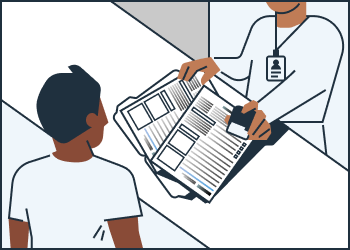
At least a couple weeks before your court date, you should start preparing for your day in court.
PRINT EMAIL
Reach out to your spouse or the other parent at least once before your court date to see if you can agree. If an attorney is involved, reach out to the attorney instead of your spouse. You can do this in person, by phone, or in writing—whatever works best for the two of you.
What if my spouse or the other parent didn't file a response?Still reach out to try to reach an agreement. If they don't file a response, they may still come to the court date. The judge can then decide whether to hear their side. If they don't file a response or show up at the hearing, the judge will make a decision based just on what you filed.
If you have a restraining order or concerns about your safety, you don’t have to contact your spouse or partner.
If you agree, write out your agreement If you are able to agree, write it down, sign it, and submit it to the court. How to write an agreement

Sometimes things change, you get new information, or you want to add more to the paperwork you already filed. If you have new information or a document that you want the judge to consider at your court date, file it and have a copy of it served on the other side. If you can't get it filed and served before your court date, you can still bring it (along with two copies), but there's a chance the judge might not be able to consider it. Learn how to submit a document or a witness statement

Organize the papers you plan to bring to court so you can get them quickly. Put the notes with what you want to say on top followed by copies of any evidence you plan to use (statement, bills, receipts, declarations from witnesses). Also, bring a copy of what you, your spouse or the other parent filed.
In many courts, you fill out and turn in a Request for Interpreter (civil) (form INT-300). Other courts use a different form. Contact your court to find out how to ask for an interpreter.
How to ask for an accommodation for a disability
Each court has an Americans with Disabilities Act (ADA) coordinator to help persons with disabilities. To ask for an accommodation, fill out a Disability Accommodation Request (form MC-410). Turn the form in to your court's ADA coordinator at least 5 days before your court date.
Prepare for a court date
Once you’ve prepared, read about some basic things you’ll need to think about for your day in court, like childcare options, how early you should arrive at the courthouse, and what to wear.